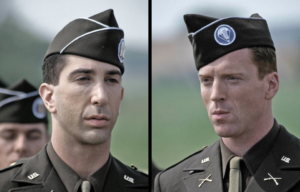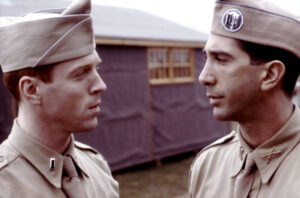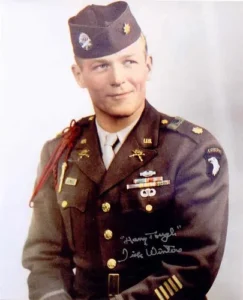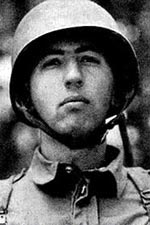
Photo Credit: 1. mdew / HBO / Dreamworks Pictures / MovieStillsDB 2. jeffw616 / HBO / Dreamworks Pictures / MovieStillsDB
Fact and fiction are blended seamlessly in the HBO miniseries Band of Brothers (2001), which can sometimes make it hard to determine what really happened and what was embellished. While the majority of the story is accurate to the actions of Easy Company, 506th Parachute Infantry Regiment, 101st Airborne Division during the Second World War, there was one scene, in particular, that we were curious about: Richard Winters’ court-martial in the first episode.
We always wondered if the real Maj. Winters stuck it to his captain by requesting the court-martial. As it turns out, he really did.
Court-martial scene in Band of Brothers

Band of Brothers, 2021. (Photo Credit: jeffw616 / HBO / Dreamworks Pictures / MovieStillsDB)
In the premiere episode of Band of Brothers, Capt. Herbert Sobel (David Schwimmer) takes disciplinary action against then-1st Lt. Richard Winters (Damian Lewis) for failing to show up on time to inspect the soldiers cleaning the latrines. However, Sobel had switched the time of inspection at the last moment, which Winters was unaware of.
Despite claiming that he’d tried to call him and even had a runner sent to deliver the message, Winters never caught wind of the time change. It’s important to note the home where Winters was staying at the time didn’t have a phone and that a runner never arrived.
Sobel proceeds to punish Winters for the minor infraction, giving him a choice and saying, “So, your options are quite simple, lieutenant. Punishment for your offenses will be denial of a 48-hour pass for 60 days. Or, you may initiate a letter of appeal and request a trial by court-martial.”
Sobel even tries to offer Winters some kind of understanding, telling him to take the punishment, as “you spend your weekends on base anyway.” Instead, the first lieutenant replies, “I request trial by court-martial,” before saluting his captain and leaving him in a stunned silence.
Is there any truth behind the scene?

Maj. Richard Winters. (Photo Credit: Unknown / Wikimedia Commons CC BY-SA 4.0)
In the miniseries, Herbert Sobel serves as an early antagonist who’s determined to keep Richard Winters down. His character is portrayed as one who cares more for how his men served as a reflection of himself, rather than his leadership and their wellbeing, and Band of Brothers suggests he was extremely strict and malicious during their training.
It seems it got most of Sobel’s character correct, as well as the court-martial scene. In a book by Erik Dorr about Winters, a copy of Sobel’s reprimand and Winters’ signature for requesting a trial by court-martial proves the petty interaction did, in fact, occur in real life.
As the book upon which the series is based includes the memories of surviving members of the Easy Company, 506th Parachute Infantry Regiment, 101st Airborne Division, Sobel really was as petty and harsh as Band of Brothers makes him out to be. Most of the real Easy Company disliked him, which is why what happened next, while shocking, isn’t entirely unbelievable.
Easy Company turned against Herbert Sobel

Capt. Herbert Sobel. (Photo Credit: US Army / Wikimedia Commons / Public Domain)
After Richard Winters’ court-martial, the men of Easy Company began to turn on Herbert Sobel. Soon after, their faith in him disappeared completely. Without Winters, who was performing administrative duties outside of the company during his court-martial, the paratroopers took matters into their own hands.
“A band of sergeants mutinied against Sobel, writing a letter to Col. Sink indicating their unwillingness [to] serve under the captain,” Erik Dorr wrote. “Risking their own futures, the men unleashed a verbal volley undermining Sobel’s authority and abilities. Several of the sergeants were accordingly punished for insubordination.
“Realizing how sour the situation was, Sink at last transferred the captain from Easy Company that February.”
Dorr quoted one of the paratroopers, Tech. Sgt. Donald Malarkey, as having said, “Winters quietly orchestrated the deal to force Sobel out. Not for his selfish gain, mind you; that wasn’t Winters’s style. He was among the most selfless men I’ve ever had the privilege of serving with. No, he did it for the good of the men. He did it to save their lives.”





